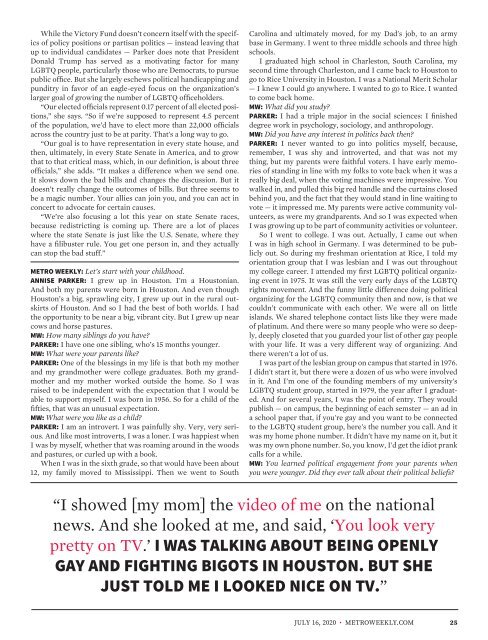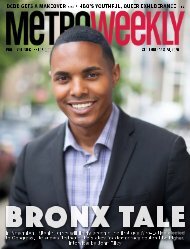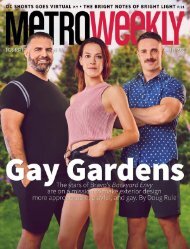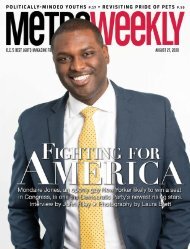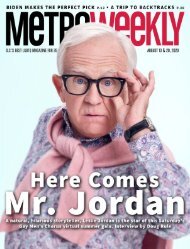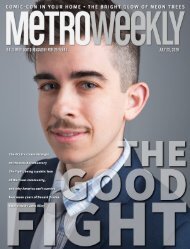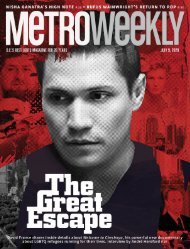Victory Fund's Annise Parker - Metro Weekly - July 16 2020
Cover Story: Annise Parker rose to become Houston’s first LGBTQ mayor. Now leading the Victory Fund, she’s helping others reach even higher. Interview by John Riley Also: The newly-rechristened Chicks return with a comeback album that showcases their greatest strengths.
Cover Story: Annise Parker rose to become Houston’s first LGBTQ mayor. Now leading the Victory Fund, she’s helping others reach even higher. Interview by John Riley
Also: The newly-rechristened Chicks return with a comeback album that showcases their greatest strengths.
You also want an ePaper? Increase the reach of your titles
YUMPU automatically turns print PDFs into web optimized ePapers that Google loves.
While the <strong>Victory</strong> Fund doesn’t concern itself with the specifics<br />
of policy positions or partisan politics — instead leaving that<br />
up to individual candidates — <strong>Parker</strong> does note that President<br />
Donald Trump has served as a motivating factor for many<br />
LGBTQ people, particularly those who are Democrats, to pursue<br />
public office. But she largely eschews political handicapping and<br />
punditry in favor of an eagle-eyed focus on the organization’s<br />
larger goal of growing the number of LGBTQ officeholders.<br />
“Our elected officials represent 0.17 percent of all elected positions,”<br />
she says. “So if we’re supposed to represent 4.5 percent<br />
of the population, we’d have to elect more than 22,000 officials<br />
across the country just to be at parity. That's a long way to go.<br />
“Our goal is to have representation in every state house, and<br />
then, ultimately, in every State Senate in America, and to grow<br />
that to that critical mass, which, in our definition, is about three<br />
officials,” she adds. “It makes a difference when we send one.<br />
It slows down the bad bills and changes the discussion. But it<br />
doesn’t really change the outcomes of bills. But three seems to<br />
be a magic number. Your allies can join you, and you can act in<br />
concert to advocate for certain causes.<br />
“We’re also focusing a lot this year on state Senate races,<br />
because redistricting is coming up. There are a lot of places<br />
where the state Senate is just like the U.S. Senate, where they<br />
have a filibuster rule. You get one person in, and they actually<br />
can stop the bad stuff.”<br />
METRO WEEKLY: Let’s start with your childhood.<br />
ANNISE PARKER: I grew up in Houston. I'm a Houstonian.<br />
And both my parents were born in Houston. And even though<br />
Houston’s a big, sprawling city, I grew up out in the rural outskirts<br />
of Houston. And so I had the best of both worlds. I had<br />
the opportunity to be near a big, vibrant city. But I grew up near<br />
cows and horse pastures.<br />
MW: How many siblings do you have?<br />
PARKER: I have one one sibling, who’s 15 months younger.<br />
MW: What were your parents like?<br />
PARKER: One of the blessings in my life is that both my mother<br />
and my grandmother were college graduates. Both my grandmother<br />
and my mother worked outside the home. So I was<br />
raised to be independent with the expectation that I would be<br />
able to support myself. I was born in 1956. So for a child of the<br />
fifties, that was an unusual expectation.<br />
MW: What were you like as a child?<br />
PARKER: I am an introvert. I was painfully shy. Very, very serious.<br />
And like most introverts, I was a loner. I was happiest when<br />
I was by myself, whether that was roaming around in the woods<br />
and pastures, or curled up with a book.<br />
When I was in the sixth grade, so that would have been about<br />
12, my family moved to Mississippi. Then we went to South<br />
Carolina and ultimately moved, for my Dad's job, to an army<br />
base in Germany. I went to three middle schools and three high<br />
schools.<br />
I graduated high school in Charleston, South Carolina, my<br />
second time through Charleston, and I came back to Houston to<br />
go to Rice University in Houston. I was a National Merit Scholar<br />
— I knew I could go anywhere. I wanted to go to Rice. I wanted<br />
to come back home.<br />
MW: What did you study?<br />
PARKER: I had a triple major in the social sciences: I finished<br />
degree work in psychology, sociology, and anthropology.<br />
MW: Did you have any interest in politics back then?<br />
PARKER: I never wanted to go into politics myself, because,<br />
remember, I was shy and introverted, and that was not my<br />
thing, but my parents were faithful voters. I have early memories<br />
of standing in line with my folks to vote back when it was a<br />
really big deal, when the voting machines were impressive. You<br />
walked in, and pulled this big red handle and the curtains closed<br />
behind you, and the fact that they would stand in line waiting to<br />
vote — it impressed me. My parents were active community volunteers,<br />
as were my grandparents. And so I was expected when<br />
I was growing up to be part of community activities or volunteer.<br />
So I went to college. I was out. Actually, I came out when<br />
I was in high school in Germany. I was determined to be publicly<br />
out. So during my freshman orientation at Rice, I told my<br />
orientation group that I was lesbian and I was out throughout<br />
my college career. I attended my first LGBTQ political organizing<br />
event in 1975. It was still the very early days of the LGBTQ<br />
rights movement. And the funny little difference doing political<br />
organizing for the LGBTQ community then and now, is that we<br />
couldn’t communicate with each other. We were all on little<br />
islands. We shared telephone contact lists like they were made<br />
of platinum. And there were so many people who were so deeply,<br />
deeply closeted that you guarded your list of other gay people<br />
with your life. It was a very different way of organizing. And<br />
there weren't a lot of us.<br />
I was part of the lesbian group on campus that started in 1976.<br />
I didn't start it, but there were a dozen of us who were involved<br />
in it. And I’m one of the founding members of my university's<br />
LGBTQ student group, started in 1979, the year after I graduated.<br />
And for several years, I was the point of entry. They would<br />
publish — on campus, the beginning of each semster — an ad in<br />
a school paper that, if you're gay and you want to be connected<br />
to the LGBTQ student group, here's the number you call. And it<br />
was my home phone number. It didn't have my name on it, but it<br />
was my own phone number. So, you know, I'd get the idiot prank<br />
calls for a while.<br />
MW: You learned political engagement from your parents when<br />
you were younger. Did they ever talk about their political beliefs?<br />
“I showed [my mom] the video of me on the national<br />
news. And she looked at me, and said, ‘You look very<br />
pretty on TV.’ I WAS TALKING ABOUT BEING OPENLY<br />
GAY AND FIGHTING BIGOTS IN HOUSTON. BUT SHE<br />
JUST TOLD ME I LOOKED NICE ON TV.”<br />
JULY <strong>16</strong>, <strong>2020</strong> • METROWEEKLY.COM<br />
25


